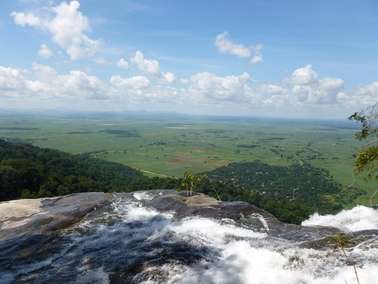Fieldwork in Tanzania brings insights on food security

"A world in which all people at all times have access to sufficient, safe, nutritious food to maintain an active and healthy life" – this was a goal identified by the United Nation's World Food Summit in 1996 and is a definition of "food security."
Achieving access to sufficient, safe and nutritious food is a complex issue, linked to agricultural practices, but also to economic development, environment, transportation and other factors.
Geography doctoral student John Connors is determined to examine the complexities of food security in an area of the world where a sufficient supply of food is far from universal – rural Tanzania.
Connors had previously participated in research into changing landscapes in New England, California and metropolitan Phoenix. He had built knowledge in these realms through fieldwork, analysis and interpretation of satellite imagery, and statistical analysis. He chose to pursue a doctorate at ASU, mentored by geography professor B.L. Turner II, a national leader in the realm of land change science.
Tanzania is currently the site of large-scale foreign investment in agriculture. The country is considered to be a convenient staging area for new development strategies in East Africa – so it is home to a broad constellation of agricultural development programs. Looking at Tanzania's broad constellation of agricultural development programs, Connor felt it would be an ideal location to further investigate landscape change and food security.
Challenges: Funding and language
Connors addressed two challenges of international research – language and cost – by a focused effort at applying for grant and fellowship support. His efforts paid off with a $15,000 grant from the United States Agency for International Development, as well as funding from ASU's Melvin G. Marcus and Matthew G. Bailey scholarship awards. In addition, a Boren Fellowship supported two months' study of Swahili in Dar es Salaam, Tanzania's largest city. He planned for five months' field work after the language study.
The focus of the research in Tanzania was to be a large-scale agricultural development program known as Kilimo Kwanzaa. Connor planned to examine the social and environmental impacts of the program. He planned to conduct interviews with rural households in central Tanzania, and, as he traveled, to gather data on land cover and land use as a foundation for interpreting satellite imagery of the region.
In particular, he planned to investigate how Tanzania's rural communities use forest resources to improve their food security, and the impact on these strategies of changes in agricultural policies – such as those of Kilimo Kwanzaa.
Unexpected findings
Now, after two months' study of the Swahili language and three months' work in his study area, Connors has a very different perception of the changes taking place. In the past, the area was dominated by small-scale farms. Several development programs, including Kilimo Kwanzaa, supported initiatives that enlisted the small-scale farmers to grow crops for larger farms, which impacts the farmers' practices and standards but helps the farmers avoid the challenging task of getting their produce to market.
"Speaking with various government agencies and NGOs, all agree that the area has undergone extensive change in recent years," Connors explained. "The different groups interpreted the sources of changes and the extent of their impacts on food security in vastly different ways.
"However, all the groups agreed that human migration is perhaps the greatest factor transforming livelihoods and the landscape in the region."
As Connors learned, changes in land policies, declining rainfall and land degradation have led to a large in-migration of farmers who, as well as growing crops, raise livestock. "I expected planned development programs to be the dominant force in transforming land use and resource dependence – but I found that the entirely unplanned migration process is perhaps the most critical change to the area," said Connors.
"Not only are the immigrant groups converting lands to cattle grazing, they also use animal labor, which allows them to farm much larger areas." Adding to the impacts, the immigrants' farming practices are being adopted by non-immigrant farmers.
The international research experience
Asked about some of the challenges of doing research in a foreign country, Connors points to the lack of infrastructure and amenities that are taken for granted in the United States. Poor roads and transit often stretch geographically short journeys into long expeditions. Internet and phone coverage are extensive, but not always reliable.
"Students seeking to conduct international research should pursue it wholeheartedly but prepare themselves for unexpected obstacles. Everything is likely to take longer than anticipated," comments Connors.
"Regardless, those who accept these challenges will be rewarded with an experience that will transform their research. From the classroom and through computer screens, many research topics and places remain too abstract to comprehend. I believe that on-the-ground experience through fieldwork, particularly abroad, is essential to advancing the depth of one's knowledge."
Provided by Arizona State University




















